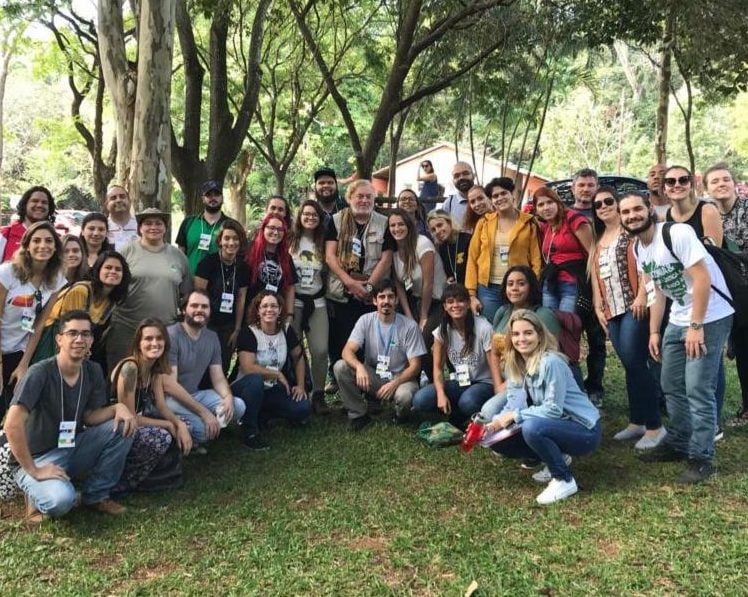Travelling two thousand kilometres for Brazilian zoo animals
The Wild Welfare team has been in Brazil, where they travelled thousands of kilometres across the country visiting zoos to carry out welfare audits and give animal welfare training to zoo staff.
As part of our ongoing project assisting the Brazilian Association of Zoos and Aquariums (AZAB), our team pushed forward AZAB’s welfare certification programme, conducting welfare audits in five AZAB, facilities as well as attending the association’s 43rd annual conference to present to zoo staff about reptile welfare.
Assessing zoos against AZAB’s welfare standard, our team travelled more than 2,000km, to visit Belo Horizonte Zoo in Belo Horizonte, Usipa Rescue Centre in Minas Gerais and Varginha Zoo, Piricicaba Zoo and Ribeirão Preto Zoo, all in Sao Paulo state.
The aim of the welfare programme is for AZAB members to attain the standard and receive welfare certification, demonstrating their commitment to the highest levels of animal care and welfare. To date eight facilities have achieved certification out of 26 that have been assessed in the three years since the project started.
Wild Welfare’s field director and project leader for the Brazil project, said: “That eight out of 26 facilities have now been certified demonstrates the thoroughness and rigour of the certification process and the high standard of animal welfare required.
“I am pleased with this result, as it is a clear indicator that changes in approach to animal welfare are definitely occurring within Brazilian facilities.”
As well as carrying out zoo audits, Dave Morgan gave a reptile care and welfare workshop to AZAB’s conference delegates. It was well received by a number of professional reptile people, who were able to learn about the latest findings from animal welfare research on special requirements for snakes and stressors for captive reptiles.
“All the latest research points to conventional reptile husbandry culture and techniques as possibly being a primary cause for poor welfare of reptiles in captivity, especially those kept as pets,” Dave Morgan said.
“We know how challenging it can be to identify health issues in reptiles and the same goes for welfare issues – they just don’t behave in the same way as birds and mammals do when stressed or bored.
“With this in mind, it’s vital zoos and other captive facilities stay right up to date with the latest welfare thinking and ensure they make changes in the way they care and provide for their reptiles to ensure optimum welfare.”
Wild Welfare partner Margaret Whittaker, also presented at the conference, on the topics of elephant foot care and large mammal husbandry and welfare certificates were handed to previously assessed facilities that have qualified for AZAB’s welfare certification; Sao Paulo Aquarium, Guarulhos Zoo, Beto Carrero World, Complexo Ambiental Cyro Gevaerd, Sabina Aquarium, Ititipa Zoo and Collegio Dante.
As part of our five-year project plan for Brazil, we are looking to assess 50 zoos, which is about two thirds of AZAB’s membership. We are returning to Brazil later this year for more zoo audits as we push this programme even further forward for animal welfare across the country.
Thanks to everyone on the auditing team, including Claudia Igayara (President of AZAB and Guarulhos Zoo), Cláudio Mass (of Zoo Pomerode, AZAB past president), Gladstone Arauja of Belo Horizonte Zoo, Henrique Almeida from Ubatuba Aquarium and Margaret Whittaker.
To offset some of our carbon footprint, Wild Welfare donates to Plant Your Future, a non-profit working with Peruvian farmers to restore and protect Amazon rainforest and farm sustainably.
~ENDS~
Notes to Editors
For more information or interview requests please contact Wild Welfare on communications@wildwelfare.org
Wild Welfare is a global organisation committed to improving animal welfare for captive wild animals. By uniting the world’s leading zoos, zoo associations and animal welfare organisations, we build trusting partnerships that help provide long-term solutions to critical wild animal welfare issues.
Our vision is to end the suffering of captive wild animals around the world and ensure full and sustainable protection is given to all animals in human care. Find out more at www.wildwelfare.org. Registered charity in England (no.1165941).
Image © Wild Welfare: Dave Morgan with AZAB conference delegates





